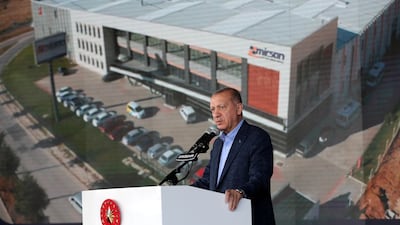When Turkish President Recep Tayyip Erdogan stepped on to the stage in the western city of Eskisehir, few imagined he was about to drop an unprecedented diplomatic bombshell.
By announcing his intention to expel 10 ambassadors over their support for jailed businessman and activist Osman Kavala, Mr Erdogan threatened to inflict a devastating blow to Turkey’s fragile relationship with the West.
Declaring the diplomats persona non grata, or unwelcome persons, not only risks ties that Turkey had been seeking to repair but could also further damage the embattled economy.
The envoys represent seven of Ankara’s Nato allies, including the US, Germany and France, as well as EU members. Germany is Turkey’s largest market while the US is its third biggest. The two countries accounted for more than 15 per cent of Turkish exports between them last year.
The crisis began when the ambassadors issued a statement on October 18, calling for Mr Kavala’s release after four years’ imprisonment without being convicted of a crime.
His case has been widely criticised as a bid to shutdown free speech and lacking evidence.

Mr Kavala, 64, was acquitted last year of charges linked to nationwide anti-government protests in 2013 but the ruling was overturned and joined to charges relating to a 2016 coup attempt.
The European Court of Human Rights had called for his release in 2019 and the Council of Europe says it will start infringement proceedings against Turkey at the end of November if Mr Kavala is not released.
Following their message, the ambassadors were summoned to the foreign ministry for a dressing down. During a return flight from Africa the following day, Mr Erdogan hinted to journalists they could be kicked out.
While most observers put his comments down to rhetoric, it appears Mr Erdogan was sincere in his remarks. Over the next few days foreign ministry officials tried to roll back the president’s plan, according to the Anka news agency.
Then came Saturday’s unequivocal announcement.
“I gave the instruction to our foreign minister and said ‘You will immediately handle the persona non grata declaration of these 10 ambassadors,’” Mr Erdogan told a crowd of supporters in Eskisehir.

Yasar Yakis, a career diplomat who served as foreign minister in the early years of Mr Erdogan’s government, described the declaration as “an instruction that should not have been given”.
“They should leave this kind of work to the diplomats and determine how the issue is formulated,” he said.
Whether Turkey will proceed with the expulsions remains up in the air. Formal notices have not been served, according to most of the intended recipients. At Mr Erdogan's weekly Cabinet meeting on Monday, he said the ambassadors had taken a step back and would be more careful in their statements.
"Our government will not shy away from any further steps to show that we will never compromise our national sovereignty," said Fahrettin Altun, Turkey's communications director, on Twitter.
If they are removed, Ankara faces tit-for-tat responses from the 10 nations, which also include Canada, the Netherlands, New Zealand, Denmark, Sweden, Norway and Finland.
“International relations are an arm wrestle,” said Mr Yakis. “Turkey is currently in no position to bend the wrists of these 10 countries. There is a possibility that Turkey will suffer more from this conflict.”
The crisis is likely to derail Mr Erdogan’s plans for a face-to-face meeting with US President Joe Biden at a G20 meeting in Rome next weekend.

It could also lead to tougher US sanctions over Turkey’s purchase of Russian missiles and hamper plans for it to buy new F-16 jets from Washington, according to Naim Baburoglu, a faculty member at Istanbul Aydin University.
The financial impact of cutting ties with some of the world’s largest economies will also damage Ankara’s efforts to attract foreign investment after the lira has gone through a series of record lows in recent weeks.
Inflation stands slightly under 20 per cent amid growing scepticism over the independence of the Central Bank in setting monetary policy.
“We shouldn’t have shot ourselves in the foot,” said Utku Cakirozer, an opposition member of parliament’s foreign affairs committee.
“Turkey cannot tolerate new crises. It is necessary to evaluate whether this decision that will harm or benefit the national interests of our country.”
Turkey’s precarious economic situation and Mr Erdogan’s drop in the opinion polls have been suggested as the reason for his reaction to the ambassadors’ statement.
“The decision to deport the 10 ambassadors is an attempt to completely change the agenda, to forget about [price] hikes, costs, the economic crisis and unemployment,” Mr Cakirozer said.
“It’s a very dangerous game. Of the 10 countries, Turkey has the most important trading partners, we have allies. This triggers another economic and political crisis,” he added.


